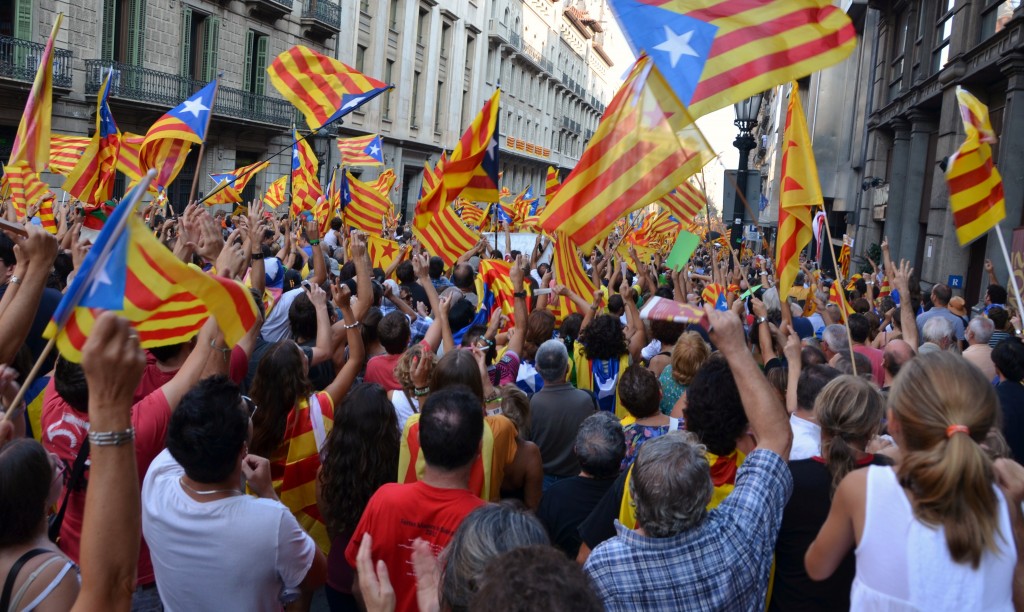08.02.2021 - 12:34
|
Actualització: 08.02.2021 - 13:34
Unlike Scotland, where the SNP is the undisputed champion pushing to separate from the UK, Catalonia has at least two major parties competing to lead the independence movement forward. In the past years of coalition government, this competition has descended into occasional rows, now increased as they are campaigning ahead of the 14 February election.
On one side there’s Junts per Catalunya (JxCat), the party created by exiled Catalan president Carles Puigdemont, who went to Brussels after the 2017 independence referendum to avoid prison and be able to keep his political activity. On the other, there’s Esquerra Republicana (ERC), the left-wing party led by Puigdemont’s former vice president, Oriol Junqueras, who stayed in Catalonia and was sentenced to serve 13 years in prison for sedition.
In 2015, both parties formed a coalition government with the goal of making Catalonia an independent state. The closest they’ve been to delivering on their promise was the fall of 2017, when more than two million Catalans voted in an unauthorized referendum, followed by a declaration of independence. In response, Spain sacked Puigdemont’s cabinet, imposed direct rule from Madrid and dissolved the parliament to call fresh polls.
Next step
Even in this extraordinary situation, pro-independence parties retained a parliamentary majority, which allowed JxCat and ERC to stay in power. They share one goal but their approaches to what the next step should be differ and has led them to clash on some occasions during the election campaign.
Esquerra defends pursuing dialogue with Spain’s left-wing government, which they helped put in power after voting out of office the conservative Mariano Rajoy in 2018, following a corruption scandal. In return for parliamentary support, ERC hopes to get an agreed referendum and an amnesty for all politicians and activists facing prosecution for their role in the independence bid. JxCat, in contrast, distrusts any negotiations with Spain, says that PP and PSOE are aligned in regard to Catalonia and believes that the only way to achieve independence is through a “peaceful confrontation” similar to the 2017 referendum.
While polls initially put ERC ahead of JxCat, recent surveys suggest they’re going neck to neck into election day. The Catalan government-funded CEO agency predicts ERC will take 34-35 seats, up from its current 32. JxCat, currently holding 34 seats, would get 32-34. Should the pro-independence bloc retain a parliamentary majority, whatever party prevails between JxCat and ERC will be in a position to appoint the next head of government. Their leading presidential candidates are current vice president Pere Aragonès for ERC, and former Catalan minister Laura Borràs for JxCat.
Republican kingmaker CUP
While they still have great political influence and feature prominently during the election campaign, neither Puigdemont nor Junqueras are in a position to become president: Puigdemont already tried to reclaim his post from abroad in 2018, but didn’t succeed; Junqueras is allowed to leave prison on day permits and campaign in person, but in 2018 he was banned from holding public office for 13 years.
Even if ERC and JxCat manage to overcome their political differences to form a new coalition government, they might again need external support from other pro-independence parties. Up until now, this role has been reserved for far-left CUP. An anti-capitalist party deeply rooted in social movements, CUP has been the kingmaker of the pro-independence bloc for years. Currently holding four seats, polls predict they might get twice as many MPs this time around. Still, their power will rely less on the exact number of seats, and more on whether they help pro-independence parties to have a majority or not.
Yet for the first time, CUP might no longer be the smallest pro-independence party in parliament. PDeCAT are the heirs of CDC, the hegemonic center-right party that ruled Catalonia for most of the post-Franco period, and while they ran under the JxCat umbrella in 2017, they opted out and face the risk of being left with no seats at all.


